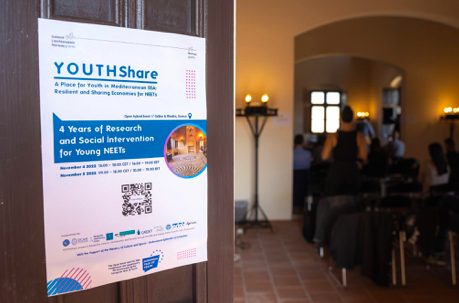On Saturday November 5th, the second day of the two-day event “4 Years of Research and Social Intervention for Young NEETs”, the YOUTHShare Colloquium/ Mini Conference took place. A hybrid event with esteemed participants joining either on site, the Hospice of St Catherine in the Medieval of Rhodes in Greece, or online. The aim of the event was to provide a live forum to renowned scholars, academics and researchers from various institutions and backgrounds to confer on youth employment, with focus on young NEETs, and relevant policies, as well as define the structural and socio-spatial parameters of youth unemployment and precariousness in the labour market.
The interesting colloquium started with the keynote speaker Dr David Farrugia from Newcastle University, Australia, member of the Newcastle Youth Studies Network and sociologist, with specific focus on unemployment, labour and labour force identity formation. In his speech titled “Space, Youth and Work”, Dr Farrugia approached the relationship between youth and its spatiality, and young workers in the production of space. He noted that youth is a phenomenon spatially distributed, as well as structurally and institutionally organised. More precisely, three epistemological and ontological considerations were underlined in the relation between spatiality and youth: Youth as developmental time, youth as a governmental project and the legacy of youth transitions in the youth and work correlation. For example, when youth is considered as a governmental project, it means that projects that have the goal to embolden political change or economic development by placing youth as “agents of economic growth” in the Global South, then “young people’s cognitive and emotional development is seen as a synonymous to their capacity to produce value and compete within global marketplaces”.
In his speech, Dr Farrugia introduced also his concept of “detemporalisation of youth”, or the “evaporation of any legible temporality to young people’s biographies”. Youth are learning through education, “global notions” of development, considered, in a global context, as the key to escape poverty and grow economically. But missing the local and temporal contextualisation, means that education, under that light and as a tool to enhance one’s life condition, results in graduate unemployment and limited professional time in the labour market.
Following keynote speech, the rest of the Colloquium was divided into two sessions, the first one titled the“NEETs entrapped by labour market policies in the European Union (EU), and the second “NEETs and youth employment, challenges and policy responses” with young and experienced researchers as presenters and respondents. The topics discussed in the first session concerned socio-economic drivers and gender divisions about NEETs in the EU South, and youth labour markets. The subjects of the second session were about the challenges vested with the NEET identity in the EU South, youth unemployment and inactivity in regions experiencing energy transition, and a critical overview of the EU employment policy.
The event was addressed by Dr Stefanos Drakos, Vice-Mayor of Rhodes for Cultural Monuments and Urban Planning and was attended by representatives of the local authorities, academics and researchers institutions. The event concluded with questions that led to interesting discussions about tackling youth unemployment among the participants.
The Colloquium/ Mini Conference was organised with the support of the Ministry of Culture and Sports – Dodecanese Ephorate of Antiquities and was part of the events for the European Year of Youth.


